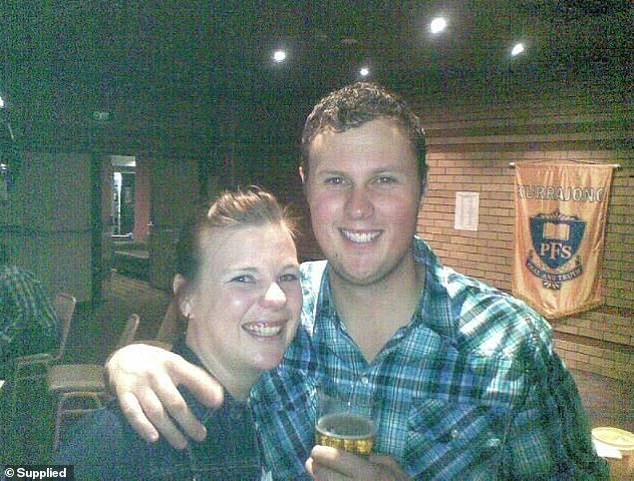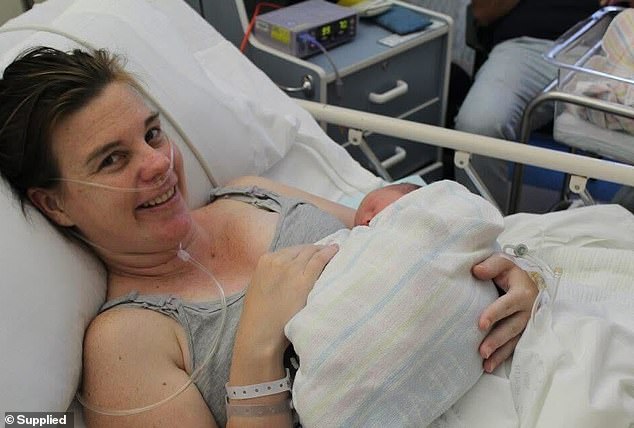The basketball court had always been Melissa Sullivan’s sanctuary – a place to forget the turmoil of her divorce and the reality of raising her daughters alone.
Even though her muscles ached and fatigue set in earlier than usual after games, the 31-year-old chalked it up to stress and a two-year hiatus from the sport.
Melissa never imagined these were subtle signs of something far more sinister.
‘I thought the symptoms were just stress from my divorce and being unfit,’ Melissa, now 45, told Daily Mail.
‘I considered seeing a chiropractor but, being a busy mum, it wasn’t high on my priority list. I put my girls first. Life was busy and I was fatigued, but ignored it.’
Melissa says although she had pain in the upper left side under her rib cage that would radiate through to her back, it wasn’t ‘excruciating’, so she just carried on.
Over time, the red flags multiplied. Melissa noticed she was gaining weight, creeping from size eight to 14. Still, she put it down to stress – selling her home, shielding her girls from the impact of her divorce, navigating a new relationship as a single mum.

At the time of her diagnosis, Melissa was in a new relationship with Braden (right)
Then came the bouts of dizziness.
‘It got to the point where I was getting quite lightheaded and would need to sit down in public, sometimes for 15 minutes,’ she said.
‘Looking back, it was quite embarrassing. I remember being in Kmart and just had to stop. Mum was like, “Oh, come on,” then she drove me home.’
One night after playing basketball in 2011, Melissa returned home feeling suddenly ill, convinced she had gastro because she ‘couldn’t stop vomiting’.
‘The next day I took the girls to school, [my new partner] Braden went to work and I went to the doctor who sent me off to have a blood test,’ she said.
‘I walked across the road to get the bloods done and I could feel that lightheadedness come back. So I called my sister to come pick me up and she took me straight to Bathurst Base Hospital.’
In the emergency department, Melissa was given morphine for pain that proved far more severe than she realised.
After an ultrasound revealed nothing unusual, Melissa was sent for a CT scan. An hour later, surgeons arrived to discuss her results.

During the Whipple surgery, Melissa was unknowingly pregnant
They revealed they’d found a mass at the top of her pancreas that would require further investigation.
‘I’ll never forget that moment because I was so angry. I kept thinking, “Why me? Haven’t I been through enough? Particularly with the divorce.”‘
In April, after a series of biopsies and scans, doctors confirmed Melissa’s diagnosis: a rare type of pancreatic cancer – a solid pseudopapillary mass, the size of a grapefruit.
This particular tumour primarily affects the pancreas of young women and, at the time, only 33 people in Australia had ever been diagnosed with it.
Despite the horrifying diagnosis, Melissa was told she was ‘lucky’.
‘The tumour’s location meant that if it had been any other type [of cancer], I might have had only two and a half weeks to live,’ she said.
Her best chance of survival was a complex operation known as Whipple surgery. Surgeons needed to remove half of Melissa’s stomach, her gallbladder, the head of her pancreas, and part of her bowel. Then, they reconstructed her digestive tract using the remaining section.
Melissa describes it as an ‘awful’ surgery.
‘My stomach was so swollen. I spent four days in ICU and ten days on the ward. I could only eat baby food and pureed food. Then I gradually built up my intake,’ she said.
Thankfully, the surgery was a success and Melissa didn’t require chemo or radiotherapy.
After being discharged from hospital, she moved in with her parents so they could help with school runs and meals during the recovery period.
Her daughters were aged six and eight at the time, and she didn’t use the word ‘cancer’ around them.
‘We told them, “Mum’s not very well. She’s got something in her tummy that the doctors need to take out. We don’t know how long it’ll take to get better. We’re just going to move in with Nan and Pop for a bit,”‘ she recalled.
‘I think because we were so positive about it and we were all moving in as a family unit, they were happy and just trusted the process.’
Just two months later, something unexpected happened.
Melissa’s ankles started to swell and she realised she couldn’t remember when she’d last had a period.
Believing it may be due to surgery complications, she went to see her specialist, who told her it was normal to skip a period after surgery due to the stress on the body.
Melissa took a test anyway – and was stunned to find it was positive. Even more shocking, a scan revealed she was already 20 weeks pregnant.
Somehow, she’d undergone major surgery and endured weeks of recovery, never knowing she was carrying a child.
That joy was shadowed by fear: had the surgery, anaesthetic and powerful pain relief harmed her unborn baby?
Doctors said the outcome was uncertain. But regular scans showed her baby developing normally – and Melissa’s son arrived healthy and strong in December that year.
She and partner Braden went on to have a daughter together 18 months later.
Although Melissa counts herself lucky to have survived, she developed Type 2 diabetes as a result of her cancer and continues to undergo biannual check-ups to ensure it has not returned.
Pancreatic cancer is the eighth most common cancer in Australia, yet it ranks as the third deadliest. Fewer than three in ten people survive a year after diagnosis, and the five-year survival rate is just 13 per cent.
This September, Australians are encouraged to honour those lost to pancreatic cancer and stand with those living with the disease by joining Pankind’s Remember September initiative. The community will collectively walk 75 kilometres each in memory of the 75 Australians who lose their lives to pancreatic cancer every week.
Melissa is taking part, aiming to walk 150 kilometres this month to raise funds for pancreatic cancer research.
